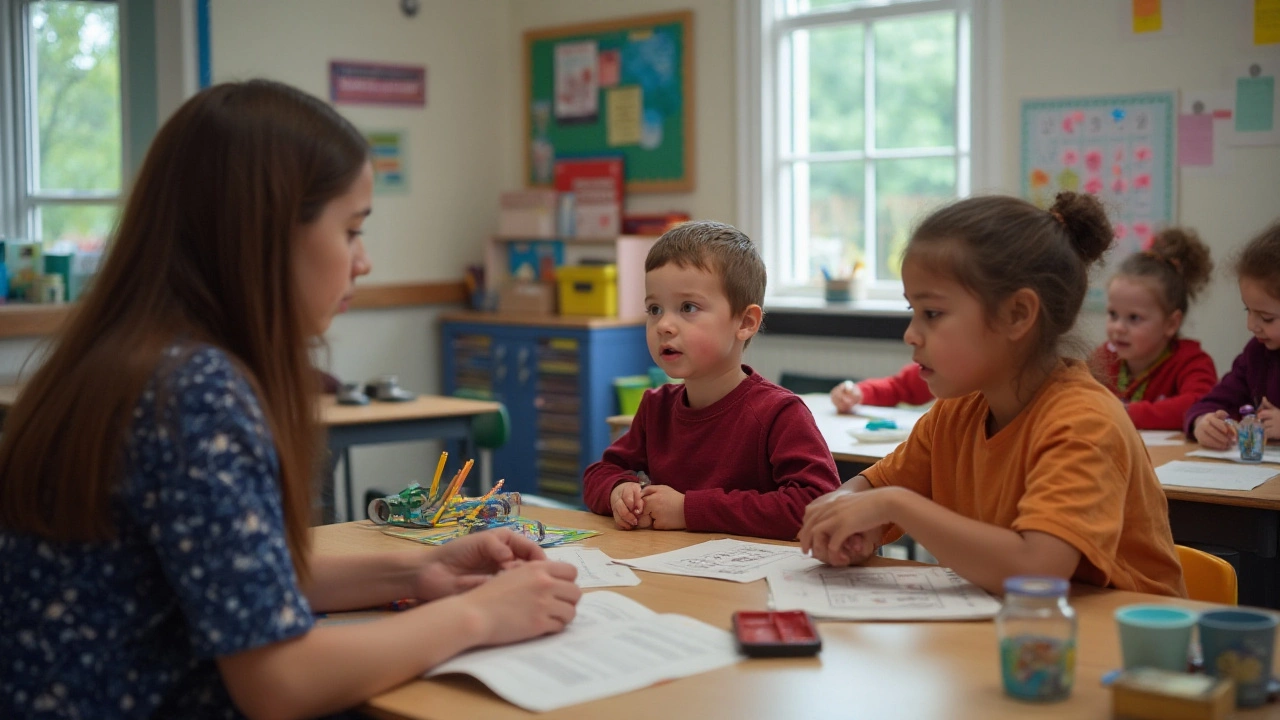Transitioning from childhood to adulthood can be a complex journey for individuals with special needs. This period often requires considerable planning and support to address the evolving needs of young adults. Their journey may involve navigating new educational settings, exploring job possibilities, and understanding the intricacies of living independently.
Stepping into adulthood entails more than just managing practical aspects; it's about creating a path that acknowledges each individual's strengths and aspirations. As they embark on this new chapter, the role of families, educators, and community resources becomes indispensable in facilitating a smooth and informed transition.
- Educational and Vocational Transitions
- Social and Community Integration
- Financial and Legal Considerations
- Independent Living and Daily Life Skills
Educational and Vocational Transitions
As young adults with special needs move beyond the familiar boundaries of childhood education, they encounter the intricate pathways of higher education and vocational opportunities. This transition demands a precise understanding of the individual's unique learning requirements, coupled with aspirations and interests that will guide them toward fulfilling futures. For many of these young adults, post-secondary education might mean entering a college or a vocational training program designed with comprehensive support systems. Each setting focuses on fostering a more independent learning style while remaining adaptive to specific needs.
Traditional universities and colleges frequently provide disability services that can help bridge the gap, offering resources such as extended time on exams, note-taking assistants, and adaptive technology. There's growing recognition of the potential these students possess, with many institutions developing more inclusive environments. An interesting point to note is the rise of specialized programs like Think College, which promotes inclusive higher education for individuals with intellectual disabilities. As these opportunities expand, young adults can choose areas aligned with their career aspirations, gaining both academic and life skills.
On the vocational side, options are equally diverse. Many community colleges provide tailored courses that target practical job skills alongside personal development. Vocational Rehabilitation Services also play a pivotal role, offering personalized career counseling, job placement strategies, and training. These programs aim to match an individual’s skills with realistic job opportunities, providing internships or apprenticeships in various sectors.
“Equal access to learning is essential for achieving economic and personal independence for individuals with disabilities,” notes the Association on Higher Education and Disability (AHEAD).These sentiments reflect the overall goal of creating an equitable landscape where every person can pursue their chosen path without hindrance.
Advancements in technology are reshaping how education and vocational training are delivered. Assistive technologies, such as speech-to-text programs and personalized learning platforms, are becoming more sophisticated and accessible. Providing customized learning experiences, these technologies enable students to interact with content in a way that best suits their comprehension and retention capabilities.
With thoughtful planning and dedicated support, young adults with special needs are increasingly finding avenues that recognize their talents and provide them with the tools to succeed. True progression is measured not just by individual achievements but by the systems in place that respect and nurture every learner’s potential. This holistic approach, one that balances educational aspirations with vocational realities, serves as the foundation for a more inclusive and diverse society.

Social and Community Integration
Social and community integration is a pivotal aspect of transitioning into adulthood for young individuals with special needs. This phase brings a myriad of opportunities and challenges, as it centers around building meaningful connections and fostering a sense of belonging. While educational and vocational development carve out paths for self-reliance, connecting with others forms the heart of a healthy, fulfilling life. It is crucial to address social isolation, which can be a significant hurdle for many, ensuring these individuals are not left on the fringes of society.
For special needs individuals, social integration often means learning to navigate new environments and relationships outside of familiar routines. Schools and community programs can play a significant role in facilitating this process by organizing social skills workshops and extracurricular activities that focus on team-building and collaboration. Every interaction is an opportunity to practice crucial social skills. Programs like the "Buddy System" have shown remarkable success by pairing individuals with peers who share similar interests, fostering authentic friendships that enhance social competencies.
According to a report by the National Center for Special Education Research, establishing these peer connections significantly boosts self-esteem and decreases the feeling of social exclusion among young adults with special needs.
Community engagement goes beyond interpersonal relationships; it involves active participation in community events, volunteering, and cultural activities. Being part of a community organization—whether it's a local sports team, theater group, or club—helps young adults gain confidence and a sense of autonomy. These activities offer both regular social interaction and hands-on experiences, which are invaluable for personal growth. Local governments and non-profits often develop inclusive programs aimed at integrating those with special needs into the broader community dialogue, aiming to cultivate a more inclusive culture overall.
Practical Steps for Social and Community Involvement
Implementing structured plans can significantly enhance social integration. A strategic approach might involve taking small yet intentional steps that align with personal interests and social goals. Start by assessing the individual's hobbies and interests, which can guide them in choosing activities where they are most comfortable. Encourage participation in local workshops or clubs that resonate with their passions. Once an activity is pinpointed, setting short-term goals—like attending a weekly meeting or participating in a community event—can help build confidence and create a framework for success.
- Attend local events regularly to build familiarity and rapport with community members.
- Reach out to community centers for programs tailored to special needs individuals.
- Utilize social media groups to connect with events and people with similar interests.
Ultimately, blending into the community is about creating and nurturing spaces where each individual feels valued and understood. The journey toward community integration can be nuanced, requiring patience and creativity. With the right support system in place, these individuals can transition smoothly into environments that celebrate their unique perspectives and contributions, enriching both their lives and those of the people around them.

Financial and Legal Considerations
Handling financial and legal matters is a pivotal aspect for individuals with special needs as they move into adulthood. This task requires ongoing planning and management to ensure long-term security and well-being. The earlier families start considering these aspects, the better prepared they will be to support their loved ones. One vital step is understanding government benefits, such as Social Security Disability Insurance (SSDI) and other supplemental programs, which can provide financial assistance to eligible individuals. These benefits act as a safety net, helping cover essential living expenses where other income might fall short.
In addition to understanding benefits, it’s important to have knowledge about setting up a special needs trust. This legal arrangement allows families to allocate funds for their child’s future needs without jeopardizing their eligibility for government benefits. A well-structured trust ensures that the individual can maintain their quality of life, obtaining supplemental funding for personal and recreational activities not covered by public benefits. Hiring an attorney with expertise in special needs law can be beneficial, as they can tailor the trust to address specific circumstances and goals.
Moreover, financial planning should go hand in hand with future guardianship considerations. Parents should evaluate whether their adult child will need assistance managing their affairs and the level of support necessary. Consulting with legal professionals can help determine whether establishing guardianship or seeking alternatives like a power of attorney is most appropriate. These arrangements should be made with consent and in the best interest of the individual, focusing on promoting their autonomy and self-determination.
One significant legal milestone is establishing a comprehensive and personalized care plan. This document outlines the individual’s needs, medical requirements, and personal preferences, serving as a guide for future caregivers. Alongside, families should be prepared for healthcare transitions, including selecting medical practitioners familiar with adult issues in special needs cases. By coordinating these multiple aspects, families provide crucial continuity and stability for their loved ones.
"Proper planning creates the foundation for a secure and fulfilling future," asserts Tim McManus, an expert in special needs law, reflecting the importance of proactive financial and legal strategies.
The integration of financial and legal planning in the transition process underscores its complexity but also its significance in safeguarding the interests of special needs individuals. Comprehensive consideration of these elements not only protects their existing assets but ensures they have the necessary resources to live as independently as possible while still receiving appropriate support.

Independent Living and Daily Life Skills
Learning to live independently is a major milestone for individuals with special needs as they transition into adulthood. This experience involves acquiring essential daily life skills that allow for increased autonomy and self-reliance. The journey to independence is unique for each person and is shaped by their capabilities, support systems, and personal aspirations. Key components of independent living often include managing personal finances, mastering domestic chores, securing housing, and navigating transportation options. The empowerment that comes from handling these responsibilities can significantly enhance one's quality of life and self-esteem.
Education programs focused on life skills are invaluable resources in this context. Many schools provide programs tailored to teach relevant life skills that help students prepare for independent living post-graduation. These programs emphasize practical tasks such as meal planning, grocery shopping, and personal hygiene, encouraging practice both in and out of class. By offering real-world scenarios, they provide a practical context that is both engaging and effective. Importantly, the success of these initiatives relies heavily on the collaborative effort of educators, family members, and the individuals themselves, fostering a network of support and continuity.
"Transitioning to adulthood is not merely about adapting to new challenges; it is about harnessing one's strengths to create a fulfilling life," says Mary Driscoll, a prominent advocate for people with disabilities.
In addition to formal education, community-based programs offer hands-on experiences that further bolster these skills. Such programs often facilitate peer interactions and provide mentoring opportunities that are vital for building social networks. Engaging with peers and mentors helps young adults learn to communicate effectively, resolve conflicts, and build relationships, all of which are crucial for integration into the community. The social component of independent living cannot be overstated, as forming a supportive network can greatly enhance resilience and adaptability during this transition.
Financial literacy is another critical element. Understanding budgeting, banking, and the concepts of income and expenses empowers individuals to make informed decisions regarding spending and saving. Teaching strategies such as setting up automatic bill payments and breaking down expenses into manageable categories can ease concerns over financial management. A practical approach might involve simulations or setting up a mock economy where individuals can practice transactions and financial planning. These experiences prepare them for real-life scenarios they will encounter as they take charge of their financial health.
Finally, access to housing often represents a significant hurdle. Finding suitable living accommodations that balance independence with necessary support services requires careful consideration. Many individuals may start with supported living arrangements or group homes that provide a blend of freedom and assistance. Navigating these options requires knowledge of available resources and sometimes advocacy to secure the right fit. Understanding tenancy rights and responsibilities is also crucial, and embracing technology can assist—using apps for home management or safety alerts, for instance, can promote both independence and security. This holistic approach ensures that as young adults step into their new roles, they do so with confidence and dignity.


Write a comment